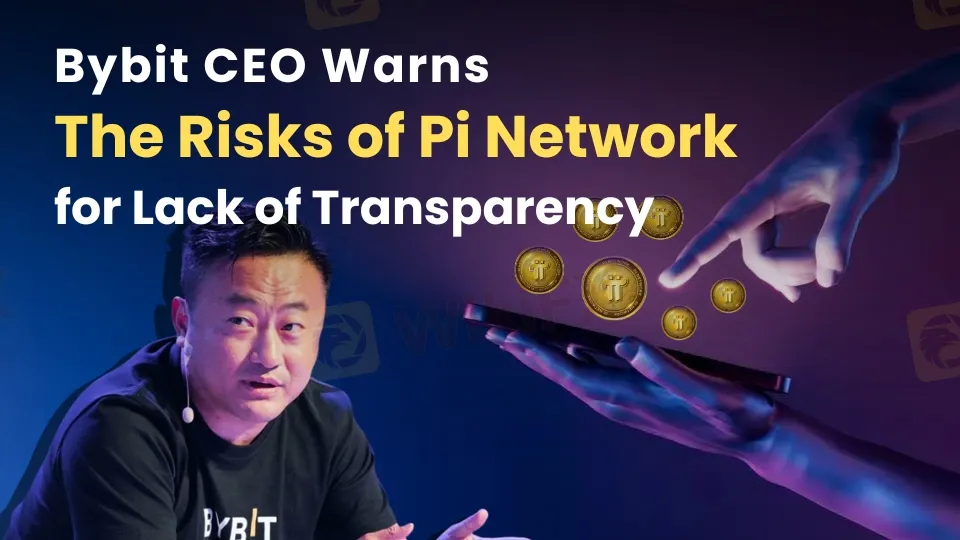简体中文
繁體中文
English
Pусский
日本語
ภาษาไทย
Tiếng Việt
Bahasa Indonesia
Español
हिन्दी
Filippiiniläinen
Français
Deutsch
Português
Türkçe
한국어
العربية
Bybit CEO Warns Against Risks of Pi Network for Lack of Transparency
Abstract:Bybit's Ben Zhou highlights the dangers of Pi Network, emphasizing transparency issues and the risks of crypto trading for inexperienced users.

Bybit CEO Calls Pi Network a Threat to Inexperienced Crypto Users
In an interview with the Vietnamese newspaper VnExpress in February 2025, Ben Zhou, CEO of Bybit—a prominent cryptocurrency exchange—criticized the Pi Network project and its native cryptocurrency, $PI. Zhou explained why Bybit has no plans to list $PI, pointing out that many Pi Network members lack basic knowledge about cryptocurrency. “They‘re ’aunties and uncles,” he remarked, suggesting that they have little understanding of blockchain technology or its origins.
“Many people ask us: ‘Will Pi be on Bybit?’ Although we dont engage deeply with this project, we still conduct fundamental research on it, just like we do with other cryptocurrencies,” Zhou commented. His statements emphasized a cautious stance toward Pi Network, particularly aimed at individuals who may have been swayed by crypto summits or hype.
Reason #1: Lack of Transparency
Zhous primary critique of Pi Network is its lack of transparency, which he described as vague despite appearances to the contrary. His concerns come in the wake of a major hack targeting Bybit, which occurred after Pi Network launched on an open mainnet and $PI was listed on other exchanges. In that incident, over $1.46 billion was stolen from the Bybit platform, an attack attributed to the North Korean Lazarus Group.
Zhou stressed that the hack could have been far worse if not for Bybit‘s commitment to openness. “Transparency is critical in the crypto world,” he said, adding that Pi Network appeared opaque even at face value. Another red flag for Zhou was the absence of a visible development team. “The really weird part is you just don’t see the back-end team. They mention a ‘Stanford guy,’ but you never see them in real life or hear anything substantial,” he explained. Zhou suggested that the Pi Network team should hold regular discussions—perhaps via livestream—“so we can see what you actually want to build.” Instead, he claimed, the Pi Network team targeted Bybit with criticism rather than addressing these concerns.

Reason #2: No Roadmap, Missed Deadlines
Zhou also warned about Pi Network‘s failure to deliver on promised roadmaps and timelines. The project has repeatedly missed deadlines, leaving its system clunky and user-unfriendly, much to the disappointment of $PI miners who were promised a clear path to success. “Their ads claim, ’You only have to click here and you‘ll make a ton of money’—for free—but they dont explain how that works,” Zhou noted. He added that many users end up with nothing, experiencing occasional “drops” of value instead of real gains.
Drawing a comparison to meme coins, Zhou argued that Pi Network‘s mining campaign resembles a Ponzi scheme: early adopters may profit, while latecomers are left empty-handed. “It’s closer to a Ponzi structure than a sustainable model,” he said.
Reason #3: Targeting the Inexperienced
Zhou was particularly harsh in his assessment of Pi Network‘s user base, calling it “a generational pile of nonsense that has no concept of how hard money works.” He contrasted it with meme coin traders, whom he described as having at least some awareness of risk management. “Meme coin players know what they’re getting into and own their decisions. Pi Network, on the other hand, attracts users who dont understand the dangers,” Zhou explained. He labeled it a project that lures in “green hands”—newcomers to crypto—without providing proper education or safeguards.
Conclusion
Zhous comments highlight the warning signs surrounding Pi Network, suggesting its model poses significant risks, especially to inexperienced users. He emphasized that transparency, accountability, and responsible development are essential in the cryptocurrency industry. “A build-it-backward approach like Pi networks will struggle to earn trust from serious investors,” Zhou concluded, noting that the industry is evolving beyond such projects.

Disclaimer:
The views in this article only represent the author's personal views, and do not constitute investment advice on this platform. This platform does not guarantee the accuracy, completeness and timeliness of the information in the article, and will not be liable for any loss caused by the use of or reliance on the information in the article.
Read more

Vantage Markets Review 2025: Trusted Forex and CFD Trading Since 2009
Explore our 2025 Vantage Markets review! A trusted Sydney-based broker since 2009, offering forex, CFDs, low spreads, global regulation, and 24/7 support. Trade from $50!

IronFX vs Exness Review 2025: Comprehensive Broker Comparison
Explore an in-depth comparison between IronFX and Exness. Compare licensing, features, regulation, trading platforms, and customer service for smarter trading decisions.

eToro Review 2025: Top Trading Opportunities or Hidden Risks?
Is eToro a trustworthy broker or a scam in 2025? Explore its regulations, user reviews, and reputation to decide if it’s safe for trading forex, stocks, and crypto. Read now!

ASIC Urges Financial Licensees to Fix Register Errors Before 2026 Deadline
ASIC has warned AFS licensees to urgently correct errors on the Financial Advisers Register, with over 4,600 advisers still not meeting the 2026 qualification standard.
WikiFX Broker
Latest News
How much money will you earn by investing in Vantage Broker?
IronFX vs Exness Review 2025: Comprehensive Broker Comparison
Fraudsters Are Targeting Interactive Brokers' Users with Lookalike Emails
Everything you need to know about ADSS
SkyLine Guide 2025 Malaysia: 100 Esteemed Judges Successfully Assembled
Vantage Markets Review 2025: Trusted Forex and CFD Trading Since 2009
Top Tips to Choose the Best Forex Broker in 2025
SEBI Notifies New F&O Rules for Investors - New Derivative Trading Limits & More Amendments
Interactive Brokers: Global Office Visits and Licensing Details
U.S. Jobs Data Released: A Potential Boost for Gold Prices
Currency Calculator


